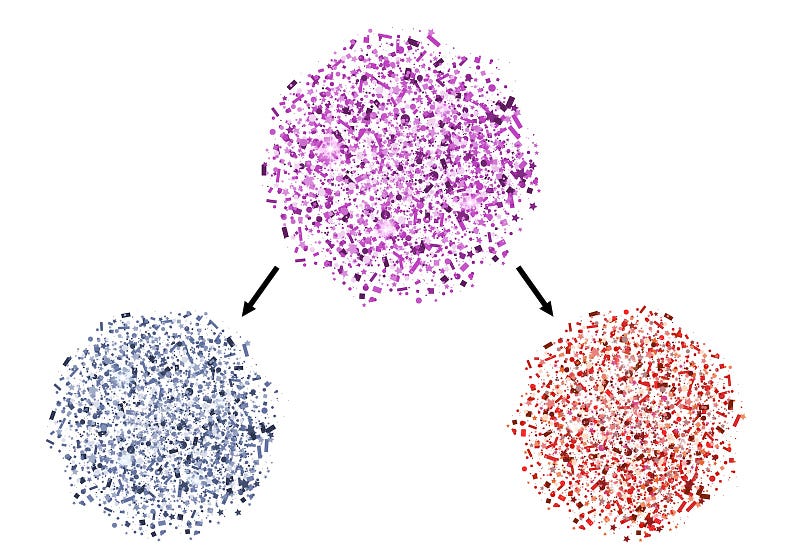Investment Thesis v2.0: Populism and Trust

INTRODUCTION
In 2018 we wrote about the unwavering growth of populism around the world (read here). We’ve received very positive feedback and believe it makes sense to take some of those ideas and formalize them into an investment thesis for the decade of 2020.
Since writing the original overview, populism continues to fiercely emerge throughout the world from all sides of the political spectrum. Trust in institutions and governments, and even in each other, continues to drop to all-time lows. We are interested in the businesses and technologies that will emerge in this new zeitgeist and how they go on to paradoxically mold the zeitgeist itself (Bitcoin being a perfect example of this). Or as we see it, honing in on the core problems and creating actual, lasting solutions in times of change.
We’ve continued to fund and support entrepreneurs, developers, and open-source communities around the world fulfilling the business and technology needs to re-establish a foundation for trust, realign incentives, and optimize security and accessibility — whether that means within existing systems, or finding completely new ways to decentralize trust, partially or completely. Open-source software is a major focus area of ours, as it hits at the heart of the increasing desire for transparency. If social media algorithms were voluntarily open-sourced for example, a consistent peer-review and self-regulation mechanism would be possible, which would add a layer of much needed trust. The same concept applies to holding institutions and governments accountable by making data and information more accessible under new open-source standards. We firmly believe software will continue to be massively open-sourced in the decade of 2020, and perhaps even become the new gold standard and expectation from society at large.
This continues to lead us down the avenue of digital assets and distributed systems, which we believe are still just getting started in redefining the global, digital economy. Having come from a background as pioneers in the big data industry, we see a similar sentiment occurring in digital assets and blockchain as the early days of open-source data systems such as Hadoop and MongoDB. Initially, these technologies were doubted by enterprises as being outlandish science projects that would not apply in the real world or scale. They were afraid to replace or change their old databases, systems, and habits. Today, every Fortune 100+ is using these big data technologies for essential infrastructure and major efficiencies. The digital asset market feels the same in many regards, although it’s trying to solve an even larger problem. The inception of Bitcoin and the cycle from widespread denial and calls for its death, to acceptance, to increasing adoption, greatly rhymes with many other innovation cycles. It has gotten to the point where even Goldman Sachs can no longer ignore Bitcoin reporting in their internal client-wide calls.
Financial regulation will also be a key theme of this decade. While there will be more polarization on the calls for increased regulation vs deregulation under the “Right-Left” political umbrellas, we believe much of that is just noise and some good things still have the potential to emerge. Chaotic environments lead to major opportunities in changing the fabric of how law and regulation are written. The US financial markets are by far the most regulated in the world and while much of that has historically enabled high standards and quality, there is a tipping point where it becomes rent-seeking and where it does not fit the realities of today’s economy and needs. Where we generally see bipartisan support is when it comes to enabling more people to participate in investment opportunities and services that were previously walled off and regulated to a fault. There is also a positive sentiment towards properly recognizing and regulating digital assets with frameworks that enable innovation. These are just a few examples but that’s the key — “the people” generally want a system that promotes innovation, liberty, and growth but also allows for inclusion into new opportunities. Despite polarization, there will be areas of bipartisan common sense that will rise.

RECENT ACTIVITIES
Broadly speaking, FinTech is often where first movers emerge during periods of change. We saw a big push towards democratizing mobile banking and investing for millennials and Gen-Z over the last 5+ years. In Q4 2019 alone, we made 4 investments into FinTech startups we are very excited about (Accern, AltoIRA, Good Money, and Percent). These are focused on things like disintermediating the financial stack, opening up investment channels globally, social impact investing, and enabling deep insights into market data that was previously dark and opaque.
From a digital asset perspective, the fund’s focus is now less on investments into new network tokens, which blossomed in 2017/2018, and more into direct seed investments, participating in upcoming network launches, supporting networks by staking and delegating, monitoring liquidity and listings of networks post-launch, and actively acquiring select ‘live’ cryptocurrencies on the top exchanges. We continued to allocate opted-in capital towards digital asset accumulation since January 2018 (when Bitcoin was ~$4,000), which has certainly paid off. We are bullish with substantial, long term, liquid positions in Bitcoin, Ethereum and also hold positions in a number of recently released, or soon to be released digital assets.
This year, we will also be involved in a number of other big network launches from earlier investments such as Filecoin, SKALE, and TrustToken. Filecoin aims to build decentralized storage infrastructure and marketplace, SKALE is allowing blockchain applications to scale in the real world, and TrustToken is building a digital asset platform where their already successful stablecoin products will exist and gain more services.
Although the overarching Bitcoin macro narrative, Ethereum 2.0, Decentralized Finance (DeFi), and stablecoins, will likely be the primary trends in 2020, we believe some value will begin to get captured at the application layer (social, collectibles, marketplaces, etc). As infrastructure and wallets become easier to use, more robust and mobile-ready, we expect some crypto-native applications to see substantial adoption over the next few years.

NOTABLE FOCUS AREAS (not limited to)
Many of our investments are either fully open-source products or have open-source roots. Open-source software creates a network effect and feedback loop that is unique and can be powerful. There are not only benefits on the transparency side but also on community building and awareness. We believe the open-core model will also massively grow over-time, where companies utilize open-source development roots to innovate new enterprise products with enhanced features and professional services wrapped around them. We foresee many more companies with open-source heritages being acquired in the decade of 2020 and it is certainly a foundational theme for the fund.
In the digital asset industry, we are particularly interested in the DeFi category, as it continues to attract attention, top talent, and has a real “setup” for adoption. There are various definitions of what “DeFi” truly means, but generally speaking we are focused on companies and open-source teams building services on top of existing protocols. In a few examples, this could mean things like yield-generating products, lending and borrowing services, decentralized exchanges, automated Robo-Advisory using smart contracts, and more. The biggest priority is helping these networks bootstrap liquidity while maintaining security and the ultimate goal is building new, highly accessible, open financial rails.
We are also highly interested in the digital asset/collectibles space. Given our past experience in gaming, we see this area exploding over the next few years. It's unclear what the first killer app will be, but a good way to capture this is through Layer 1s that will likely build and scale towards gaming and Non-Fungible Tokens (NFTs). We are on the lookout for builders in this area.
We are also searching for FinTech products that open up new investment opportunities and financial services for the masses. We see this in companies like AltoIRA mentioned above, who want to do what TurboTax did for filing taxes, but for Investment Retirement Accounts (IRAs). They want to allow anyone, including non-accredited, to invest in alternative assets (e.g. startups, private equity, real estate) that have been prohibited to just a few groups for many decades. They are also the best place to buy cryptocurrencies for your IRA. The idea of opening up investments to anyone has always been a passion of ours, which is why we’re also investors in AltoIRA’s partner WeFunder. We hope to also see continued progress on Regulation Crowdfunding and Accreditation laws— more relevant trends in opening up financial services and technology to all.
The Remote Work movement is another big focus moving into the 2020 decade, which again falls into the overarching thesis of decentralizing organizations and software development. We were very excited to follow-on invest in Turing, who aside from having an amazing brand and serious growth, have an extraordinarily sharp team building software for remote, distributed teams (the “AWS for talent”). We expect the percentage of remote workers to continue skyrocketing, as companies like Stripe and GitLab begin to formalize the process of building major remote teams and hubs, and actively factor that into reducing operational cost and improving financials.
Last but not least, we are cautiously in search of new consumer social applications. It will take time to substantially challenge the current social media incumbents, but we believe alternative approaches to social will rise that contain different incentives for users, baked-in data ownership, and better avenues for monetization and earning.

CONCLUSION
The decade of 2020 will be very polarizing. It looks like political systems around the world will be torn in two opposing directions— some towards central planning and control, and others towards balkanization and sovereignty. This tug of war has happened throughout history but always comes to a head eventually. This seems to be developing or coming to a tipping point in many countries (e.g. Hong Kong, Taiwan, China, Brazil, U.K., Italy, France, U.S., etc). There is an overarching global theme of questioning, challenging, voting against, or even revolting against long term incumbents and elites. We believe similar trends and changes will occur in technology and financial services, as centralization and subsequent fragility will begin to peak.
Big tech and finance incumbents will be legitimately challenged by new ideas and approaches. Sociopolitical change is interdependent with technology and business change. Builders and entrepreneurs often build not as a simple reaction to the world of zero-sum politics, but to shape the future of the world as they want to see it, which in turn becomes political and societal change in itself. We’re looking to invest in the best facets of this change — ones that include the basic principles of liberty and inclusion.
The decade of 2020 will be about building new infrastructure and highly accessible apps for what we call the digital economy. Things like the ability to transfer value globally without intermediaries via open-source networks, programming trust and contracts into financial assets, digitizing financial assets, opening up previously illiquid markets, allowing more people to have skin in the game, aligning customer incentives, building privacy and data ownership directly into social platforms, promoting accountability and transparency, disintermediating business models and industries that now thrive on rent-seeking and bureaucracy, and much more that perhaps we cannot even fathom quite yet.
We wish you all a Happy New Year and we will strive to invest in deeply influential teams building technology for a better, freer, more inclusive global digital economy.
UPDATE: You can now read our supplementary write-up on the accelerative force of the COVID-19 pandemic on the digital economy. READ HERE
The Content is for informational purposes only, you should not construe any such information or other material as legal, tax, investment, financial, or other advice. Nothing contained on our Site constitutes a solicitation, recommendation, endorsement, or offer by Visary Capital or any third party service provider to buy or sell any securities or other financial instruments in this or in in any other jurisdiction in which such solicitation or offer would be unlawful under the securities laws of such jurisdiction.

